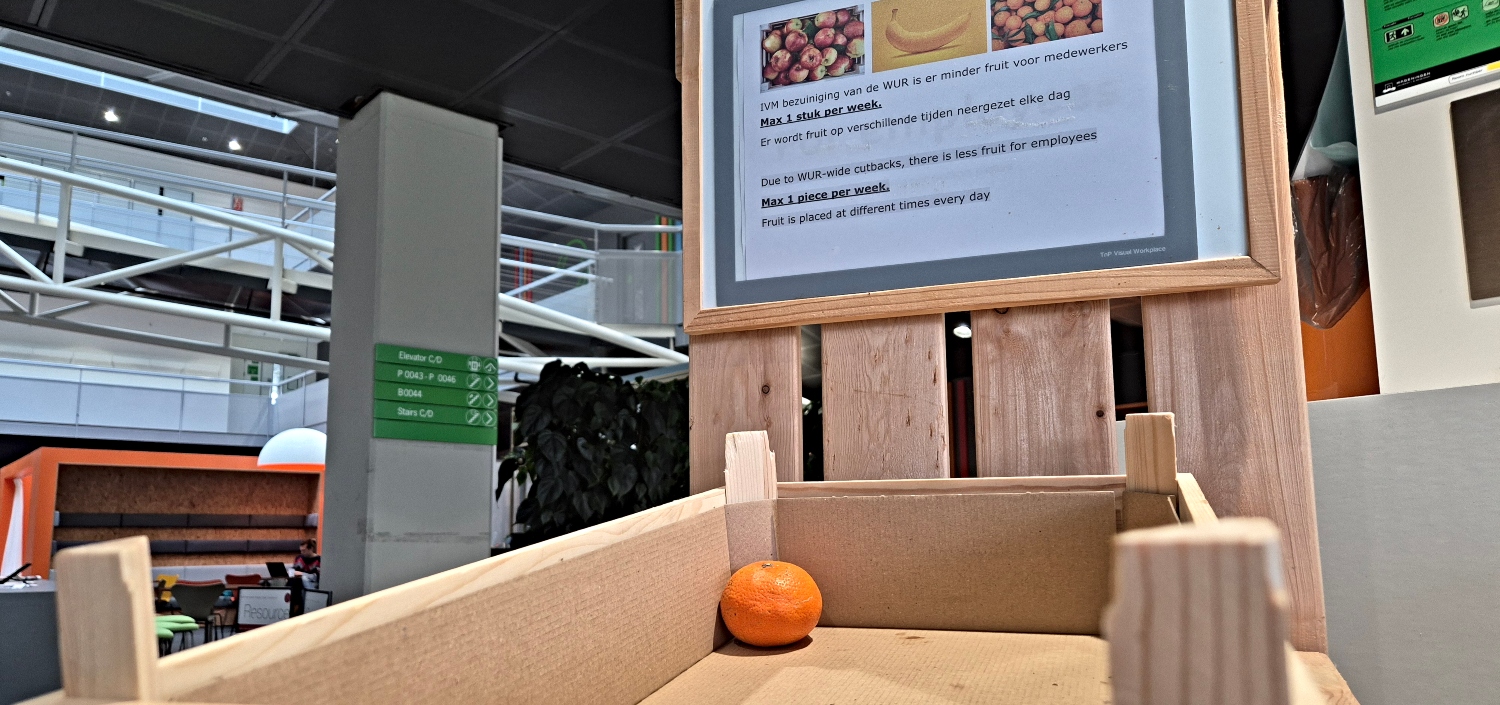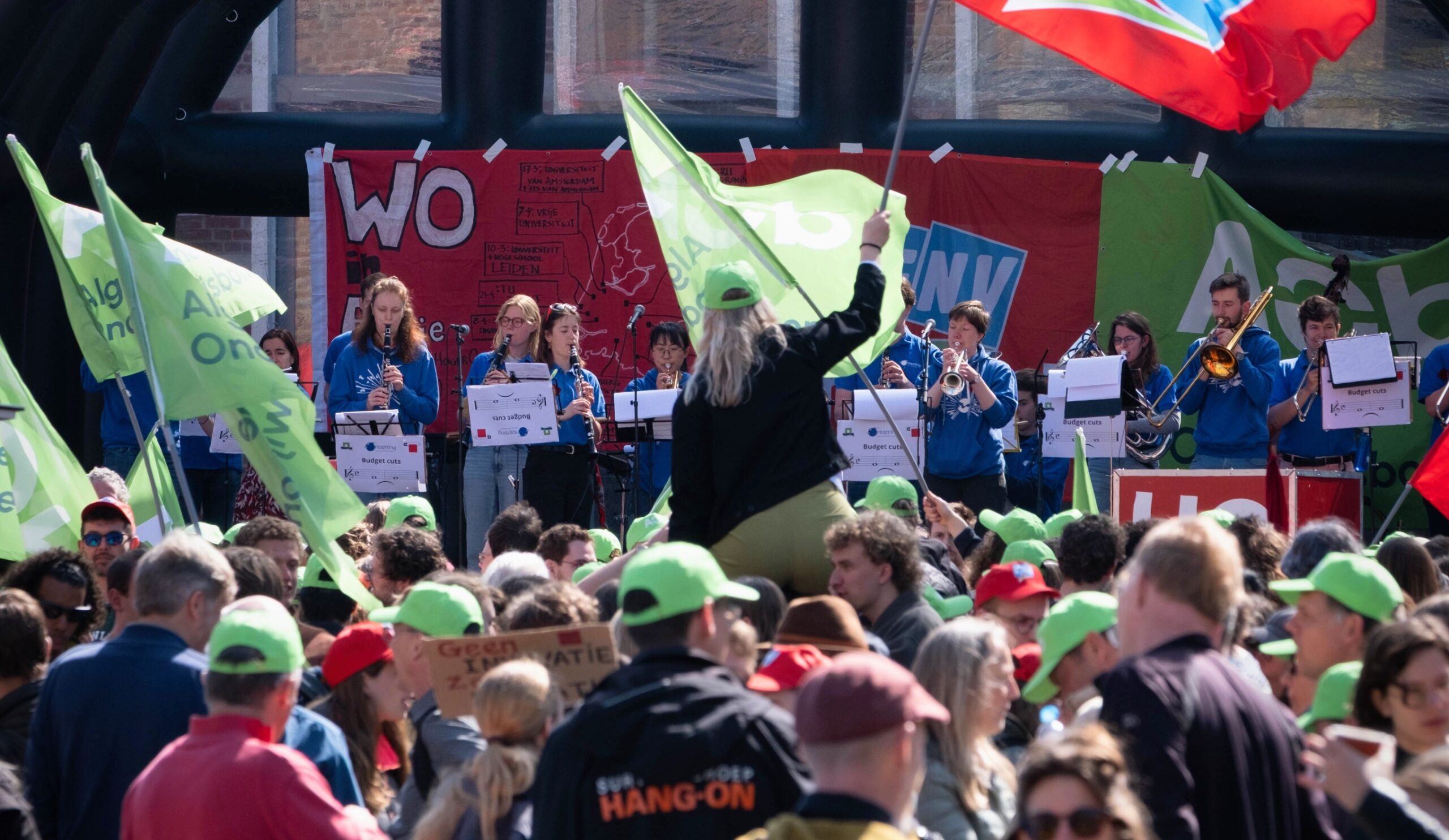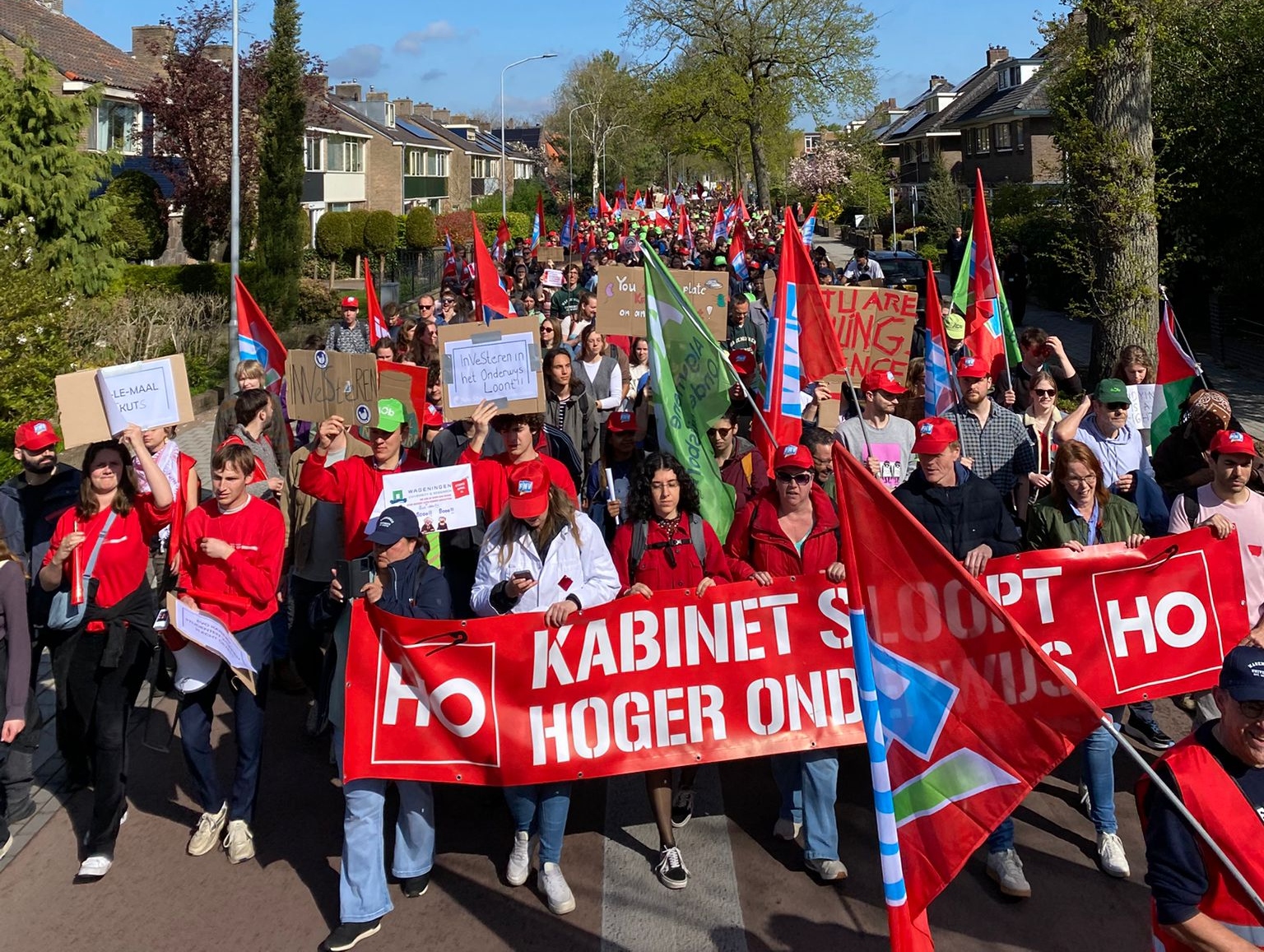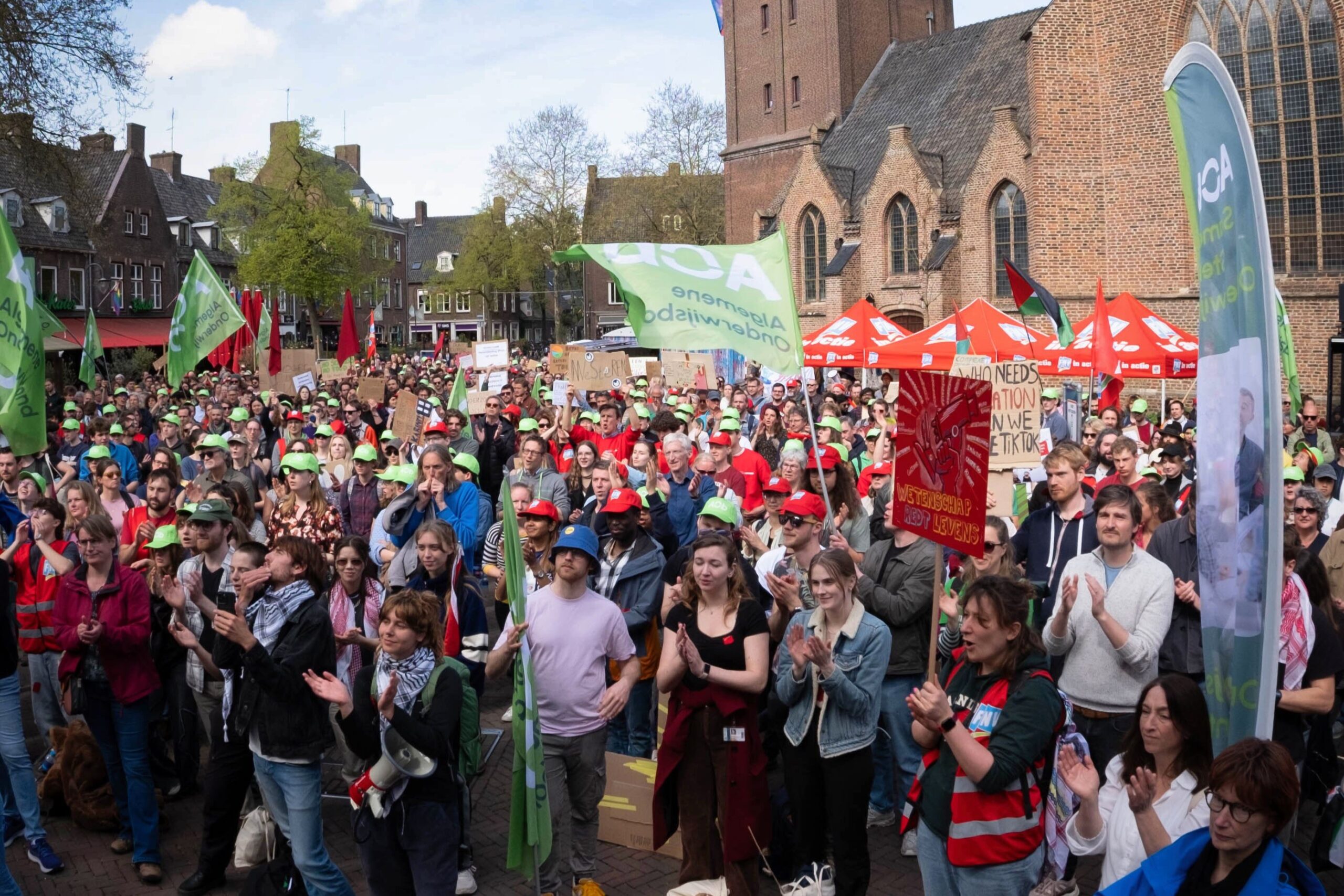Buildings closing earlier, paying more for sports and less fruit on offer. The effects of the cutbacks are slowly beginning to be felt on campus. But the really big choices in education and research still have to be made.
The generic savings requirement — cuts of five per cent in every WUR business unit — is undoubtedly achievable this year using a top-slicing approach. The task of cutting expenditure by 80 million euros by 2028 is a different matter.
‘The good news is that we’ve got time to find a good way of doing this,’ says Ernst van den Ende, the Animal Science Group director. ‘We’re trying to head slowly in that direction. WUR has reserves and a healthy financial position. That is why the Executive Board has decided not to take any panic measures. You see big differences between universities in that regard. Some are having to take tough measures in short order, with redundancies and the abolition of degree programmes. WUR is taking its time, and that is welcome.’
Although that calm is relative. Both behind the scenes and in public, people are working hard preparing for the far-reaching choices that will need to be made. Since the start of January, six working groups have been looking at proposals for cutbacks in various areas. They are using FAT (Finding Answers Together) sessions to gather ideas from staff. That should lead to results in the next month. Van den Ende: ‘Hopefully that will let us set out some broad lines at the Wageningen Management Board level that will tackle a significant proportion of the 80 million.’
You can imagine that some of the Ministry of Agriculture research programmes won’t go ahead after all
This refers to the savings of 35 million euros, the part Van den Ende says where ‘we are in control, by organizing our processes better’, for example by making the organization more efficient, reducing support staff numbers, altering the terms of employment or cutting back on what Facilities & Services does. The remaining 45 million euros will come from the basic funding for research and education. ‘These are cuts imposed on us externally,’ says Van den Ende. ‘I call that market forces. You can imagine that some of the Ministry of Agriculture research programmes won’t go ahead after all. Of course Wageningen Research will feel the effects of that.’
It’s hard to say which science group will be hit hardest. Van den Ende: ‘We just don’t know. The political landscape is unclear, to put it mildly. Plus it is changing from day to day. One moment the politicians don’t want to do anything about the nitrogen problem, the next moment they want to do loads. The latest idea of target management, for example, raises questions and therefore requires research. In Wageningen, we have the advantage of working in a very specific domain where there is a lot of interest internationally. There are major issues relating to the environment and food that need addressing. So in that sense we’re in a good position.’
Facilities
Less fruit, shorter opening hours
Staff in Atlas will now only get one apple, banana or mandarin orange a week ‘on the house’ at work. Due to the cutbacks, says the notice next to the fruit basket. It is the most tangible effect so far of the requirement to make savings of five per cent this year. The fruit is being rationed in other buildings too. The decision has got people talking.
Which is a good thing, says Facilities & Services (F&S) director Harold Swartjes. Not that he is in charge of the fruit, as it happens. ‘I think it’s good these visible measures have sparked a discussion. You can’t save an amount like 80 million euros without every student and member of staff noticing eventually. It’s also about the mindset, the realization that handing out fruit costs money.’ As the saying goes: look after the pennies, and the pounds will look after themselves. That applies to the approach F&S is using this year to save almost 8 million euros: 5.4 million on services and 2.5 million on WUR’s accommodation costs.
The savings are coming from lots of different measures. A noticeable one is the buildings’ opening hours. Lots of buildings will soon be closing earlier in the evening, at 20:00 instead of 22:00, and they will only be open half a day in the weekend. Forum, though, will stay open. Swartjes: ‘This measure saves on energy and management. Cutting the opening hours by two hours saves a lot of money. Of course, it will still be possible to access the buildings for essential research.’
Maintenance
Cuts will also be made in the maintenance of buildings and grounds. ‘We will spread the maintenance tasks out more. For example, maintenance of the labs in the teaching buildings will be carried out once every two years instead of annually. That might mean the maintenance quality is a little less across the board. To be clear, the buildings and grounds will still be in good shape, but there is scope to take it down a notch. We are also making some changes behind the scenes to the IT and we are talking to our suppliers about savings in the contracts.’
All in all, says Swartjes, these are relatively minor changes but we will notice them nevertheless. The bigger decisions needed to save 80 million euros within a couple of years still have to be taken. ‘As far as I’m concerned, that will largely mean an awareness that the many minor changes add up to big savings for WUR. That’s partly because we are such a large organization.’
The aim is not to make anyone redundant
The more major decisions won’t necessarily lead to any redundancies for Facilities & Services. Swartjes: ‘The F&S workforce (600 people) will be smaller. That is inevitable if you have to make cuts of 10 to 15 per cent. To achieve the savings for this year, we didn’t fill half of the vacancies that arose in the past six months. The aim is not to make anyone redundant, but that requires an effort. I expect my people to think about this constructively and develop their skills accordingly.’
Sports Centre De Bongerd
Paying more for sports
WUR students can do sports at De Bongerd Sports Centre all year for just 119.75 euros. That is cheaper than anywhere else in the Netherlands. But the price is going to go up a lot (possibly by about 20 euros), says the head of the centre Henri ten Klooster. Staff, who now pay 25 euros a month, will see a similar increase. That is necessary to make the required savings. ‘We’re also taking a critical look at what we offer. But it’s hard to scrap anything without making people redundant. That is because the legislation introduced in recent years has forced us to hire former freelancers and we aren’t allowed to give them more than two temporary contracts. So nearly all the staff are now employed by WUR.’
Scrapping certain sports will also affect the quality of what’s on offer, says Ten Klooster. ‘We currently offer 65 different sports. That used to be 70. There are 55 activities in the regular programme, including the lessons for the 32 student sports clubs with their 3000 or so members, and popular activities such as indoor biking, yoga and zumba. The other 15 activities rotate. We are now critically reviewing all the classes to see what the attendance is.’
Artificial grass
According to Ten Klooster, a sports pass costs 198 euros a year on average at Dutch universities. ‘Even with an increase of 20 euros, we would still be among the cheapest. If you divide that by 12, you’ll still be paying only 11 euros a month. Incidentally, we will need the consent of the Student Council for an increase above the rate of inflation.’
In addition to increasing the price and reviewing the activities on offer, Ten Klooster says they will also be scrutinizing cost areas such as the replacement of materials. Although the options are limited. ‘We have to continue with the regular replacements or we will lose our certification from the Dutch football association for matches. The upper layer of the football pitch will have to be replaced this year, or the top teams in the student football club GVC won’t be able to play in competitions.’
The cuts do mean that the planned ‘collector field’ will not go ahead. This is an innovative artificial grass playing field with a network of tubes that collects heat from the sun and transmits it to the campus thermal energy storage system. ‘This system would have let us cut our dependency on gas by 90 per cent. We would have been the first university sports centre in the world to have this. It’s such a shame it’s now being ditched.’
WUR Library
Fewer subscriptions and databases
He hasn’t lost any sleep over it, and most library users won’t notice any difference. Even so, the library will be making cuts of 650,000 euros this year. ‘This is on top of cuts of a quarter of a million to compensate for the pay rise last year,’ says director Hubert Krekels.
‘Staff costs are the biggest expenditure item. If you don’t want to make people redundant, you have to rely on people leaving voluntarily. But that isn’t happening much at the moment. One employee retired recently, and I won’t be replacing them for the time being. That does mean the Development & Innovation team will have to do the work with one less person.’ Savings can also be made in accommodation costs: ‘Postponing the replacement of chairs by a year, using fewer staff, that kind of thing.’
But the biggest step is making cuts in the collection costs. Although that is not straightforward either. ‘Annual expenditure on the collection is 4.4 million euros, but nearly all of that is in fixed contracts,’ explains Krekels. ‘A new nationwide deal was made with Elsevier just this year, so I’m stuck with that for now. Those deals are for three years. However, we were able to save 300,000 euros by scrapping individual subscriptions and access to a few databases.’
Frugal in the past
The choices are tricky, says Krekels. ‘WUR has lots of specialisms. A journal that isn’t relevant for most people can still be important for a small minority. That is a sensitive issue. We are also the leading library in the Netherlands for food and agriculture. We have obligations with respect to other universities as they have fields of expertise that we benefit from. Anyway, you run the risk of cutting back on things that you’ll have to purchase all over again in two years’ time. And you can be sure the price will have increased by more than inflation.’
I’m not looking forward to the next step
The required savings could be ‘found quite quickly’ this year with minor changes to accommodation, staffing and the collection. ‘But I’m not looking forward to the next step,’ admits Krekels. ‘We’ve always been very frugal in the past, which means we will inevitably have to cut back on our service. The staff are at the limit of what they can handle in terms of the workload. I can’t in all honesty tell them we’ll have to do the same work with fewer people.’

 One piece of fruit per person per week is a tangible effect of the cuts. Foto Resource
One piece of fruit per person per week is a tangible effect of the cuts. Foto Resource 

